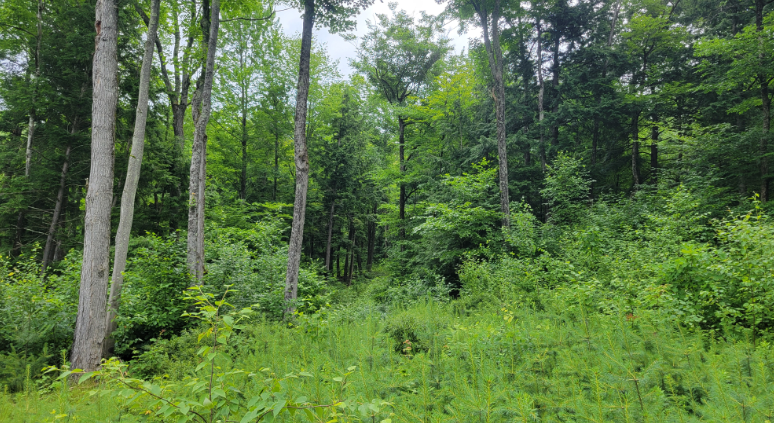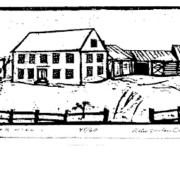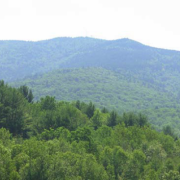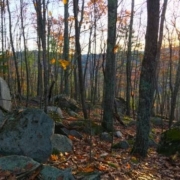Summer in the Woods
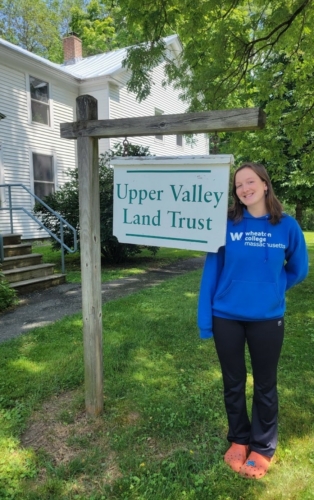
UVLT Intern Cora Day
By Cora Day
This summer I’m interning with the Upper Valley Land Trust as a seasonal land steward! As a steward, my day-day changes a lot: sometimes you can find me in the office going over files and writing reports and on other days I’ll be out in the woods monitoring a property. I’ve had the opportunity to walk with a few landowners which has been wonderful, but usually my only company is me, myself, and I. Unless of course you count deer, squirrels, chipmunks, birds, an endless amount of bugs… oh and bears. Maybe it’s just an intern’s bad luck or this summer is a bear’s paradise, but I’ve already had a few encounters with our fuzzy black mammal friends. Because of this I thought I’d freshen up on my knowledge of ursus americanus.
Black bears are very common in New Hampshire/Vermont and the mixed wetland and forest areas I’ve been walking in are their preferred habitat. These areas have low lying vegetation full of berries, nuts, tree mast, plants, and roots which they like to eat. While they search out places with low human disturbance, I know all too well that that doesn’t mean they’ll never run into any, and because of this, bears have a few communication tactics they use in certain situations. When coming upon a mama and cubs, the mama bear will make a barking or whoofing noise that alerts her cubs to go up into the trees and away from danger. Bears will also make a sort of clicking noise with their mouths and teeth that means something like “Hey, you’re a little too close to me!” We all have our own unique way of communicating so it’s important to understand each other a little more!
When they’re not encountering humans, bears are interacting with their environments in important ways. Firstly, they’re considered ecosystem engineers for their ability to impact different areas of an environment. The seeds they consume get dispersed through their scat, and they bring important nitrogen from aquatic environments through the salmon and other fish they bring ashore. Because of their wide range of habitat and food sources they are also important in the food web, helping to maintain populations such as deer.
Learning more about these animals has helped me to become more aware of my surroundings.
As I become attune with these parts of the woods, I take notice of all the signs that woodland animals leave behind: bear scat, tracks in the mud, deer paths, holes in trees that serve as homes for wildlife. It reminds me that this complicated ecosystem has so many interconnected aspects of life going on at the same time. It also reminds me that this isn’t where I call home, and I should be respectful and aware of those organisms that do.
The impact that black bears have beyond our environments are important too. For the people of New England, both indigenous and settler, the bear has served as a cultural and historical character. The website of the indigenous Oneida Nation shares this Haudenosaunee legend: What we know of as the big dipper, indigenous people saw as a big bear being followed by three hunters. His position in the sky also helps explain the seasons of the year. As summer ends, the bear is killed and his blood drips to earth where the trees turn red and brown from it. As the winter passes he lies in the sky until spring when he reawakens. Bears can also be found on Abenaki totem poles, representing power and protection.
There are also folk tales surrounding black bears that have been told in Vermont and New Hampshire. In the Northeast Kingdom of Vermont in the 1700s there was a bear known as “slipperyskin” who tormented inhabitants, causing mischief and harm to people and farms, and when trying to get caught always managed to escape. And in New Hampshire, there’s the story of Sarah Whitcher, a three year old girl who went missing, and when the town organized a search, a local man joined and said he had dreamed that she would be found near a brook with a black bear guarding her. Sarah was later found and told everyone that “a great black dog had kept her each night”.
While not always seen or talked about, black bears play and have always played a role in our lives here in New Hampshire and Vermont, and in New England in general. I’m sure if I were speaking with people now instead of through a screen we could exchange stories and family tales about the many we’ve seen over the years. And I know that in the years to come, my memories of the summer of 2024 will be that of the black bear.
https://www.nps.gov/subjects/bears/managing.htm
https://apnews.com/article/new-hampshire-4a243f362524f1d2a6d775664e3680d2

